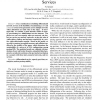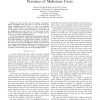394 search results - page 50 / 79 » Game theoretic models for detecting network intrusions |
INFOCOM
2000
IEEE
13 years 11 months ago
2000
IEEE
A key consideration in building differentiated network services is the feasibility of maintaining stable and consistent service level agreements across multiple networks where allo...
CORR
2004
Springer
13 years 7 months ago
2004
Springer
A growing body of literature in networked systems research relies on game theory and mechanism design to model and address the potential lack of cooperation between self-intereste...
GLOBECOM
2006
IEEE
14 years 1 months ago
2006
IEEE
— Ad hoc network users are resource constrained: Before transmitting data, they have to take into account the energy expenditure involved. Even if a user is, in principle, willin...
ICPPW
2002
IEEE
14 years 17 days ago
2002
IEEE
Incidents such as Solar Sunrise and Nimda demonstrate the need to expressively model distributed and complex network attacks. To protect information systems, system administrators...
ACMSE
2005
ACM
14 years 1 months ago
2005
ACM
Hidden Markov Model (HMM) based applications are common in various areas, but the incorporation of HMM's for anomaly detection is still in its infancy. This paper aims at cla...


